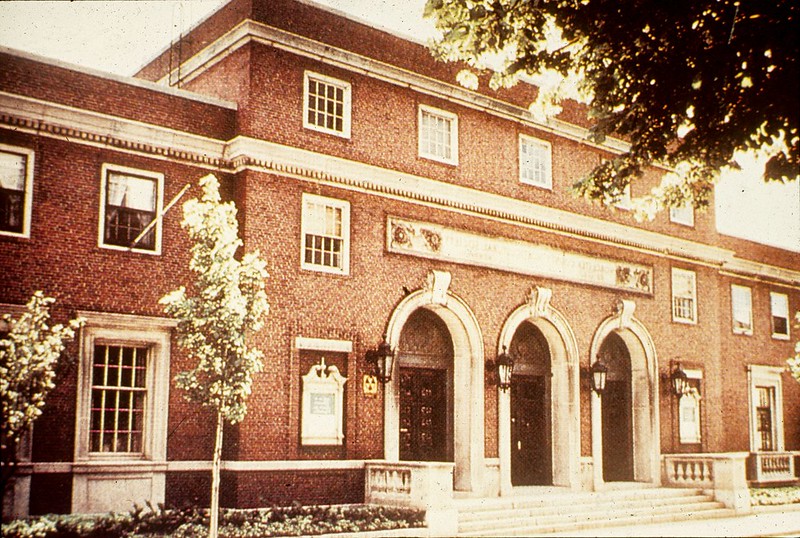
Horticultural Hall in Worcester, the original home of the Worcester County Horticultural Society.
By Alena McNamara
A lot has changed since the Worcester County Horticultural Society was founded in 1842: in Worcester, in the Society, in the state and the country and the world. Because of our long history, we can look back and ask, What was WCHS like a hundred years ago?
Overall, surprisingly similar. There were lectures, like the talks our Adult Education Program offers today. Even in close-up, there are connections: one lecture, on February 19, 1920, focused on the Maine Woods. On March 19, 2020, the New England Botanic Garden at Tower Hill READS program will feature a talk by Dr. Caitlin McDonough MacKenzie on her work in Maine on local effects of climate change.
WCHS hosted exhibitions of roses, sweet peas, gladioluses, grapes, fruits and vegetables, and chrysanthemums. The only one of these we still have is roses—2020’s instance will occur on June 28—but we have plenty of plant shows on our calendar! One wonders what 1920 WCHS members would make of the Carnivorous Plant Show (October 3 and 4, 2020).
Some things may look a little different. The women in WCHS had a “Ladies’ Day” on January 29, 1920, where they enjoyed entertainment by their fellow female members and had refreshments. It’s hard to imagine New England Botanic Garden at Tower Hill holding a “Ladies’ Day” now! That being said, this year New England Botanic Garden at Tower Hill will again host a kickoff to Worcester Pride Week on our last Free After Three Thursday of the summer. The event celebrates our lesbian, gay, bisexual, transgender, queer, and more (LGBTQ+) members, staff and visitors. Refreshments and activities will be available. So we still do hold events particularly for marginalized communities.
WCHS also took a stance on governmental issues in the 1920s. On Thursday, February 19, WCHS trustees voted to oppose Nursery Stock, Plant, and Seed Quarantine No.37 as too drastic. This quarantine was issued by the USDA in 1918 to take effect in 1919. It forbid “the importation into the United States of nursery stock and other plants and seeds from the foreign countries and localities named and from any other foreign locality and country” (USDA, 2) except as otherwise provided. The aim was to prevent various “injurious insects and fungous diseases” (USDA, 2) from entering the country, however the WCHS trustees “resolved that, we believe the…measure was altogether too drastic in its terms and discriminating in its outline” (Transactions, 10). They thought the act unduly singled out horticulture and agriculture, when pests could come in on all kinds of imports, and that previous inspection protocols were enough—this only added an extra, unnecessary layer of bureaucracy.
The quarantine required permits for the importation of anything other than plant products for medicinal or food purposes, or field, vegetable, or flower seeds. Any other plants, bulbs, nuts, and seeds were covered by the order. Anyone who wanted to bring these in had to apply to the Federal Horticultural Board for a permit, and they would be inspected on arrival.
Fascinatingly, this overlaps with the subject of last year’s New England Botanic Garden at Tower Hill READS selection, The Food Explorer. David Fairchild traveled the world finding varieties of plants unknown in the United States and bringing them back through the offices of the USDA to introduce to the country through experimental stations—like new kinds of avocados, better hops, and the Meyer Lemon. According to author Daniel Stone, Quarantine #37 “ended all private importations of plants and bulbs. The Department [USDA] was exempted from this provision, but it tarnished the reputation of Fairchild’s office as a source not of valuable material but of ominous disease” (Stone, 306). There was a split in the USDA between people who saw foreign plants as great sources of biodiversity and new or better varieties and people who thought they only spread disease. Anti-immigrant sentiment has a long history in this country, and has been used against plants as well as people. Unfortunately, in the issuance of Quarantine No. 37, the xenophobic side won.
WCHS voted to take a stance against it, though—and that’s a history that, with THBG’s current values of inclusivity and excellence, we can be proud to own.
If you want more details, the full Transactions of the Worcester County Horticultural Society in 1920 (and other years) are available online.
Alena McNamara is New England Botanic Garden at Tower Hill’s librarian.
Stone, Daniel. The Food Explorer: The True Adventures of the Globe-Trotting Botanist who Transformed What America Eats. New York: Dutton, 2018.
United States. Federal Horticultural Board. “Nursery stock, plant, and seed quarantine : notice of quarantine no. 37, with regulations (effective on and after June 1, 1919).” Retrieved from Internet Archive. https://archive.org/details/CAT31335940/page/2/mode/2up
Worcester County Horticultural Society. Transactions … Retrieved from Internet Archive. https://archive.org/details/transactionsofwo1913worc/page/n799/mode/2up
